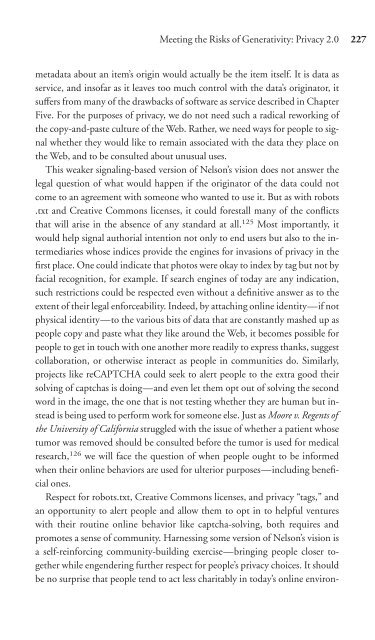Download - Future of the Internet â And how to stop it.
Download - Future of the Internet â And how to stop it.
Download - Future of the Internet â And how to stop it.
You also want an ePaper? Increase the reach of your titles
YUMPU automatically turns print PDFs into web optimized ePapers that Google loves.
Meeting <strong>the</strong> Risks <strong>of</strong> Generativ<strong>it</strong>y: Privacy 2.0 227<br />
metadata about an <strong>it</strong>em’s origin would actually be <strong>the</strong> <strong>it</strong>em <strong>it</strong>self. It is data as<br />
service, and ins<strong>of</strong>ar as <strong>it</strong> leaves <strong>to</strong>o much control w<strong>it</strong>h <strong>the</strong> data’s origina<strong>to</strong>r, <strong>it</strong><br />
suffers from many <strong>of</strong> <strong>the</strong> drawbacks <strong>of</strong> s<strong>of</strong>tware as service described in Chapter<br />
Five. For <strong>the</strong> purposes <strong>of</strong> privacy, we do not need such a radical reworking <strong>of</strong><br />
<strong>the</strong> copy-and-paste culture <strong>of</strong> <strong>the</strong> Web. Ra<strong>the</strong>r, we need ways for people <strong>to</strong> signal<br />
whe<strong>the</strong>r <strong>the</strong>y would like <strong>to</strong> remain associated w<strong>it</strong>h <strong>the</strong> data <strong>the</strong>y place on<br />
<strong>the</strong> Web, and <strong>to</strong> be consulted about unusual uses.<br />
This weaker signaling-based version <strong>of</strong> Nelson’s vision does not answer <strong>the</strong><br />
legal question <strong>of</strong> what would happen if <strong>the</strong> origina<strong>to</strong>r <strong>of</strong> <strong>the</strong> data could not<br />
come <strong>to</strong> an agreement w<strong>it</strong>h someone who wanted <strong>to</strong> use <strong>it</strong>. But as w<strong>it</strong>h robots<br />
.txt and Creative Commons licenses, <strong>it</strong> could forestall many <strong>of</strong> <strong>the</strong> conflicts<br />
that will arise in <strong>the</strong> absence <strong>of</strong> any standard at all. 125 Most importantly, <strong>it</strong><br />
would help signal authorial intention not only <strong>to</strong> end users but also <strong>to</strong> <strong>the</strong> intermediaries<br />
whose indices provide <strong>the</strong> engines for invasions <strong>of</strong> privacy in <strong>the</strong><br />
first place. One could indicate that pho<strong>to</strong>s were okay <strong>to</strong> index by tag but not by<br />
facial recogn<strong>it</strong>ion, for example. If search engines <strong>of</strong> <strong>to</strong>day are any indication,<br />
such restrictions could be respected even w<strong>it</strong>hout a defin<strong>it</strong>ive answer as <strong>to</strong> <strong>the</strong><br />
extent <strong>of</strong> <strong>the</strong>ir legal enforceabil<strong>it</strong>y. Indeed, by attaching online ident<strong>it</strong>y—if not<br />
physical ident<strong>it</strong>y—<strong>to</strong> <strong>the</strong> various b<strong>it</strong>s <strong>of</strong> data that are constantly mashed up as<br />
people copy and paste what <strong>the</strong>y like around <strong>the</strong> Web, <strong>it</strong> becomes possible for<br />
people <strong>to</strong> get in <strong>to</strong>uch w<strong>it</strong>h one ano<strong>the</strong>r more readily <strong>to</strong> express thanks, suggest<br />
collaboration, or o<strong>the</strong>rwise interact as people in commun<strong>it</strong>ies do. Similarly,<br />
projects like reCAPTCHA could seek <strong>to</strong> alert people <strong>to</strong> <strong>the</strong> extra good <strong>the</strong>ir<br />
solving <strong>of</strong> captchas is doing—and even let <strong>the</strong>m opt out <strong>of</strong> solving <strong>the</strong> second<br />
word in <strong>the</strong> image, <strong>the</strong> one that is not testing whe<strong>the</strong>r <strong>the</strong>y are human but instead<br />
is being used <strong>to</strong> perform work for someone else. Just as Moore v. Regents <strong>of</strong><br />
<strong>the</strong> Univers<strong>it</strong>y <strong>of</strong> California struggled w<strong>it</strong>h <strong>the</strong> issue <strong>of</strong> whe<strong>the</strong>r a patient whose<br />
tumor was removed should be consulted before <strong>the</strong> tumor is used for medical<br />
research, 126 we will face <strong>the</strong> question <strong>of</strong> when people ought <strong>to</strong> be informed<br />
when <strong>the</strong>ir online behaviors are used for ulterior purposes—including beneficial<br />
ones.<br />
Respect for robots.txt, Creative Commons licenses, and privacy “tags,” and<br />
an opportun<strong>it</strong>y <strong>to</strong> alert people and allow <strong>the</strong>m <strong>to</strong> opt in <strong>to</strong> helpful ventures<br />
w<strong>it</strong>h <strong>the</strong>ir routine online behavior like captcha-solving, both requires and<br />
promotes a sense <strong>of</strong> commun<strong>it</strong>y. Harnessing some version <strong>of</strong> Nelson’s vision is<br />
a self-reinforcing commun<strong>it</strong>y-building exercise—bringing people closer <strong>to</strong>ge<strong>the</strong>r<br />
while engendering fur<strong>the</strong>r respect for people’s privacy choices. It should<br />
be no surprise that people tend <strong>to</strong> act less char<strong>it</strong>ably in <strong>to</strong>day’s online environ-


